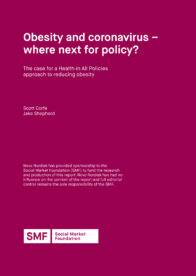Obesity and overweight have become major public health issues in the UK in recent decades. The Coronavirus pandemic has further highlighted the health consequences of living with overweight and obesity. In response, the UK Government has unveiled a new obesity strategy to get the country to “lose weight to beat coronavirus (COVID-19) and protect the NHS”.
The new obesity strategy is the latest in a series of policy interventions and strategies adopted by successive governments. Getting it right and learning lessons from the recent past will be crucial if the UK is to reduce the substantial health and economic inequalities that exist in the UK. Policy will need to recognise and reflect that obesity is a complex condition – far more so than overly simplistic narratives about diet and exercise suggest.
This report, kindly sponsored by Novo Nordisk, [1] explores what the data tell us about obesity, the current policy landscape and the likely effectiveness of policies announced to date in the Government’s obesity strategy. It draws on desk research and data analysis, as well as a nationally representative survey from Opinium, commissioned as part of this study.[2]
Key findings on COVID-19 and weight management
- One fifth (20%) of survey respondents said that they had taken new steps to reduce their weight because of coronavirus. A further 23% said that they were planning to take steps in the future. Over half (52%) have not taken steps nor do they intend to.
- Those self-reporting as having overweight and obesity were more likely to report currently taking steps to lose weight in response to coronavirus – at 24% and 28% respectively. Just over two fifths (41%) of individuals that have overweight and 28% of individuals that have obesity reported that they were not taking steps to lose weight, nor intending to.
- Among those currently taking steps to lose weight, the most frequently cited steps were doing more exercise (42%) and eating smaller portions generally (also 42%). One in ten (10%) said they were using the internet to research ways of losing weight, with a similar proportion (9%) saying they were seeking or about to use specialist weight management support such as weight reduction programmes or psychological approaches.
- Close to half (45%) of survey respondents said that the coronavirus pandemic might have had a negative impact on their ability to lose or manage their weight. A quarter (23%) said that the pandemic had led to them getting less exercise, while just under a fifth (18%) said the pandemic had led to them eating more or eating a poorer diet. Those with overweight and obesity are more likely to have reported that the pandemic had led to eating more/a poorer diet and reduced amounts of exercise.
[1] Novo Nordisk has provided sponsorship to the Social Market Foundation (SMF) to fund the research and production of this report. Novo Nordisk has had no influence on the content of the report and full editorial control remains the sole responsibility of the SMF.
[2] Novo Nordisk provided sponsorship to the Social Market Foundation (SMF) to fund the Opinium survey questions referred to in this report. The SMF finalised these questions with input from Opinium. Novo Nordisk has had no influence over the use of this data, including the selection of the results and analysis of the data. The survey sample was 2,000 UK adults, and the survey was carried out between 11th September 2020 and 15th September 2020.


